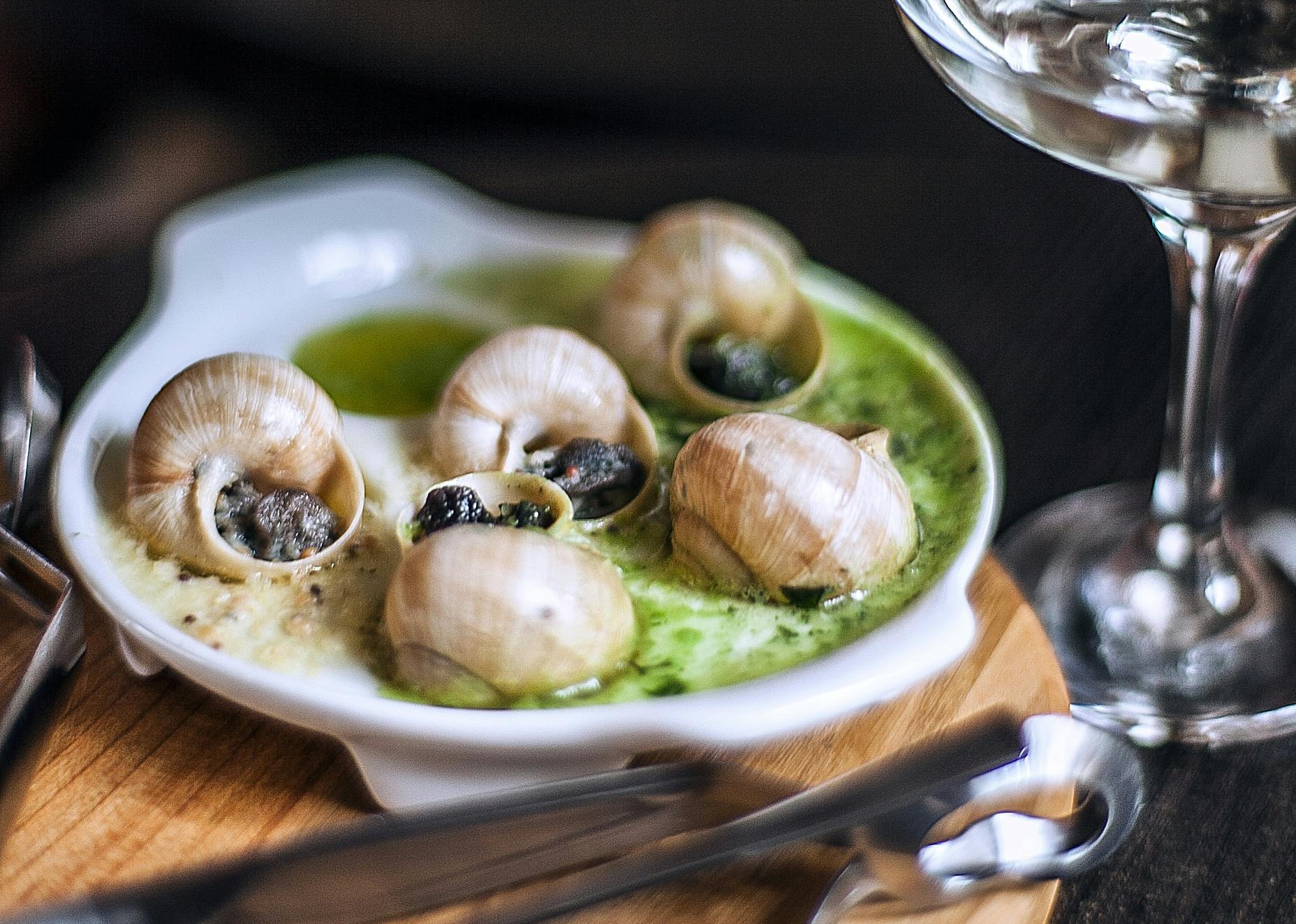
In these days of flash-in-the-pan restaurant openings, followed by “boy-that-place-sure-didn’t-last-very-long,” any restaurant that sticks around for more than five years should be commended. So, what do you say when a restaurant has been open since 2004? You say, “Way to go, Café 54! Way to go!” But the thing is, Café 54 is more than just a restaurant.
“We’re an award-winning employment program bringing amazing food to Downtown Tucson,” said Executive Director Jeff Grobe.
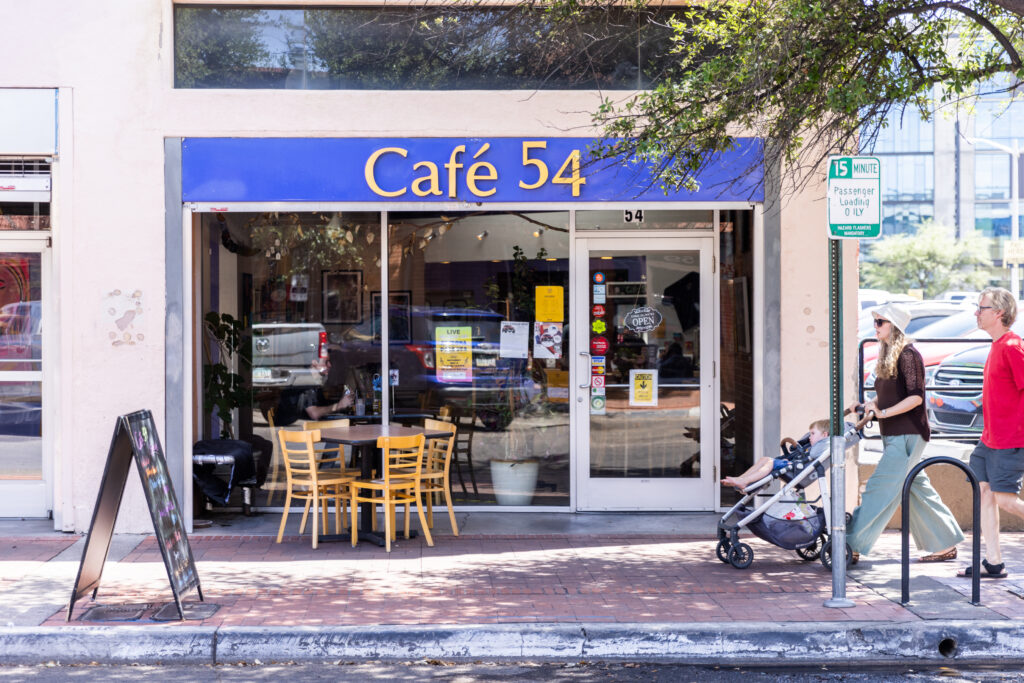
As part of the Coyote Task Force, the restaurant is a training ground for people with barriers to employment, specifically mental health and substance abuse. Founder Mindy Bernstein believed that employment can help people recover; that being employed is the driving force to recovery.
The café grew out of these beliefs.
“We’re essentially a peer-run organization, so everybody here has some sort of personal experience with mental health, substance abuse, or is in recovery,” said Program Director, Laurie Taylor. “We’re helping individuals overcome whatever obstacles to employment they may have, whether it’s a skilled base or they need that Fresh Start. We give that to them.”
That guideline is carried in detail even with the table card markers which instead of numbers, have photos and diagnoses of famous people who experienced mental health issues in their lives.
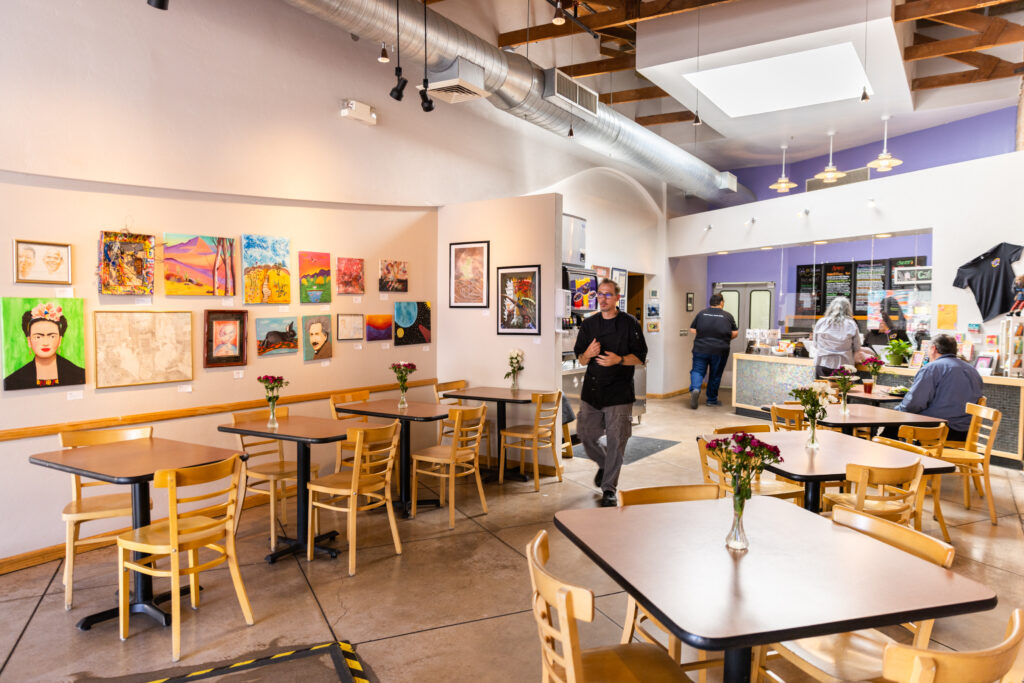
Café 54 was fast-casual long before the term became popular.
Everything is made fresh daily under the guidance of head chef, Kevin Powers. Powers has a stellar background in all things culinary.
“I’m not breaking any ceilings in the culinary world and I just try and make things taste delicious, you know? I don’t think that we need to be a James Beard award-winning café, we need to have delicious food,” said Powers. “It’s comfort food.”
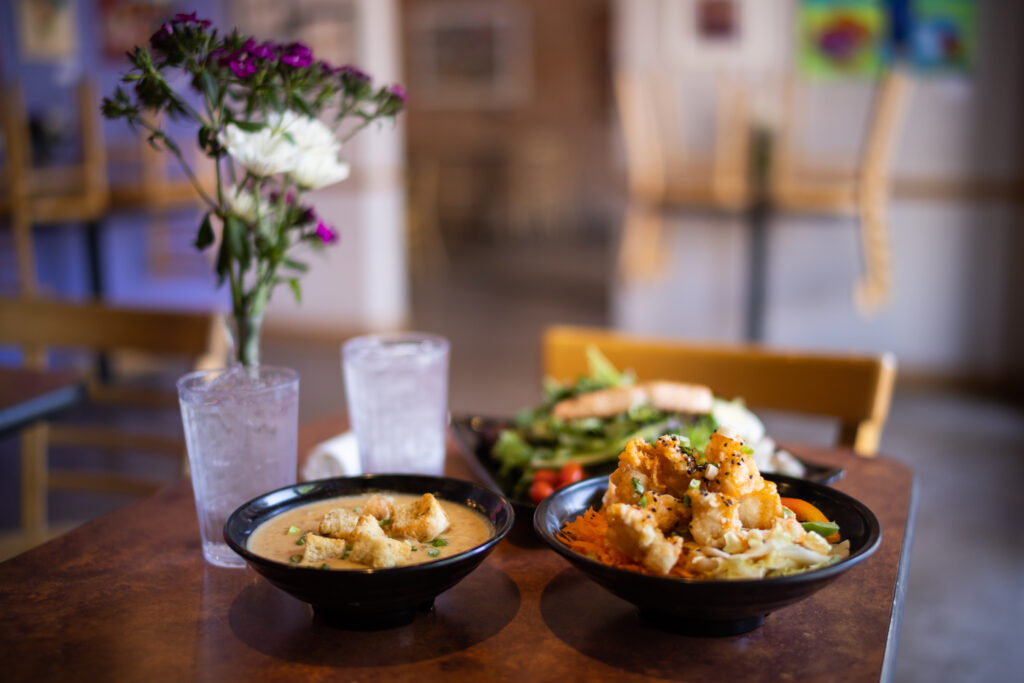
He’s being modest here. Café 54’s food is comfort food but on a most uptown level. The food is also reasonably priced. Add a comfy, but hip vibe with friendly, well-trained service, and it’s easy to see why regular customers are known to eat there a couple of times a week.
Every order starts with a housemade dinner roll. The round balls are warm, soft, and aromatic with rosemary. The server asks if you want butter or oil and vinegar for dipping.
Entrées include chicken curry, Mediterranean pasta, and a Korean bowl with marinated steak. There is a classic burger and an Impossible burger, too. Sandwiches vary from a honey citrus chicken to a tuna melt. Daily specials offer an eclectic mix.
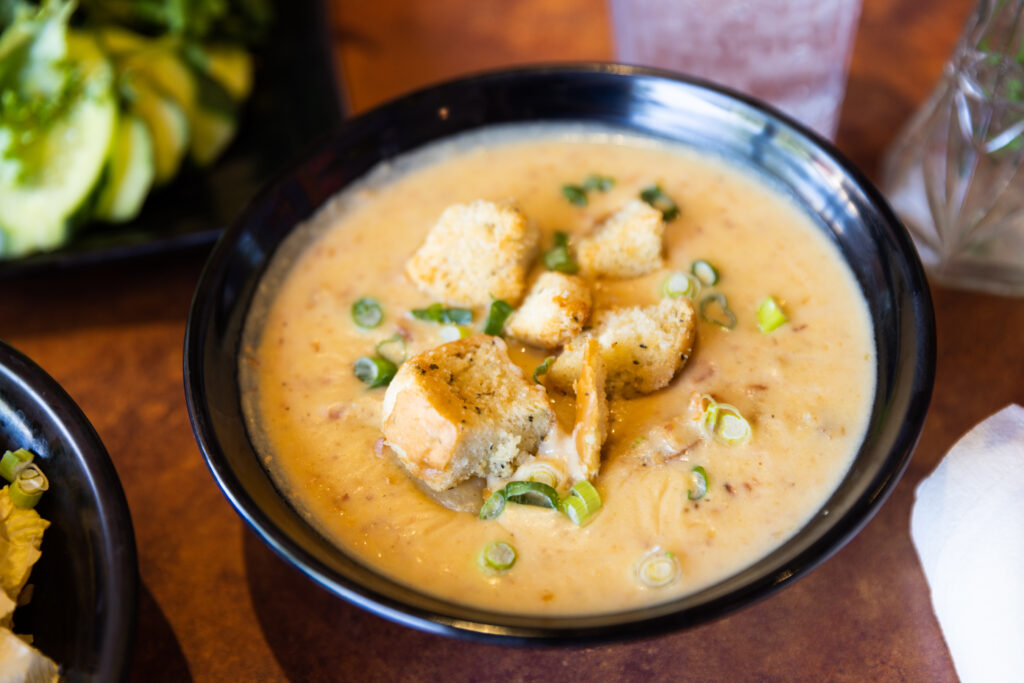
“People tell us that they love our soups,” said Grobe, also mentioning that soup options change daily.
I ordered one of my faves, the Niçoise Salad, which comes with salmon instead of tuna.
Artfully plated with spinach and mixed greens surrounded by a passel of kalamata olive, haricot verts, hard-boiled eggs, thinly sliced waffle potatoes, grape tomatoes, and slices of cucumber all dressed in a mustard vinaigrette. Café 54’s take on this classic is a winner.
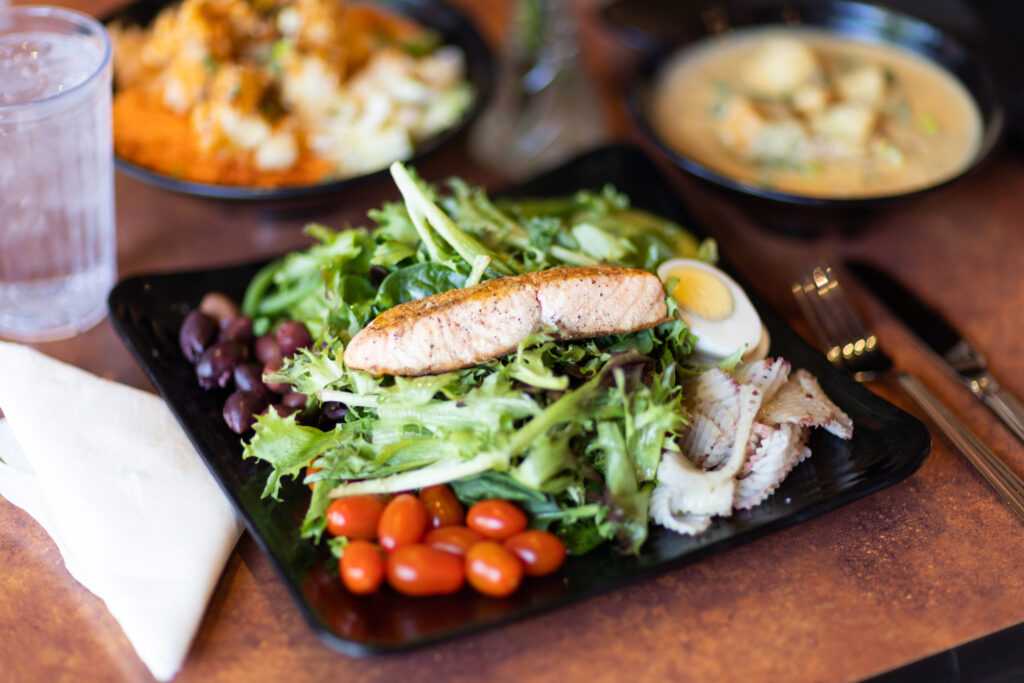
We took a California Club on toasted ciabatta to go. Other bread choices are whole grain, sourdough, and, brioche bun. Again, this was a winning combo; the right amount of turkey, avocado, Swiss cheese, a leafy green, thinly sliced tomato, and a schmear of mayo. The sandwiches come with a choice of sides: fresh fruit, a side salad, roasted veggies, or hummus with pita.
The kitchen just got a new, bigger fryer, so “the French fries are back on the menu.” Other fried options are in the works as well.
As I ate my lunch, a line began to form. Customers are a mix of Tucson movers and shakers, friends meeting for lunch, and diners on their lunch break from nearby offices.
The trainees are referred through Vocational Rehabilitation or AHCCCS. Everyone is assigned a job coach, who guides their trainees through the complexities of securing and keeping employment.
“They’re learning skills like communication, taking direction, and how to balance recovery with a work schedule. They’re learning workplace norms and habits,” said Taylor.
In addition to his chef duties, Chef Powers is also a job coach, “We teach them to be able to do work independently and stay safe at the same time,” he said.
The trainees learn all aspects of the business: dishwashing, food prep, taking orders at the cash register, food running, bussing tables, or making deliveries to nearby offices. Sometimes basic office work is included.
I took a quick tour of the kitchen. Every station was busy (except the baker, who was out that day) and everyone was intent on their work.
“We really try to mimic a typical workplace so that they have a real-life work experience while they’re here,” said Taylor.
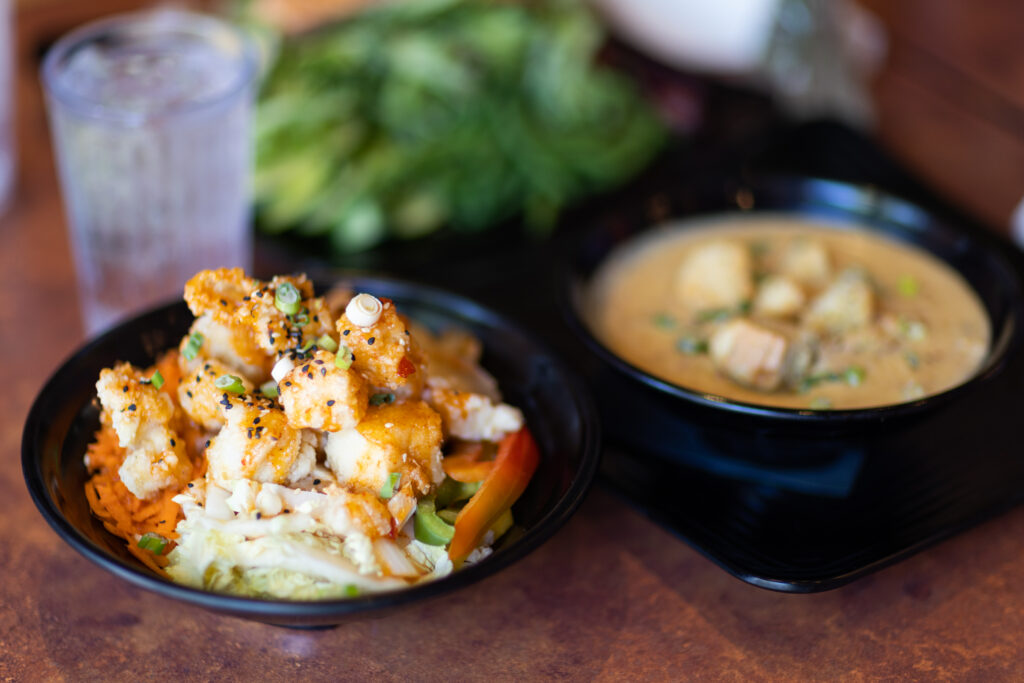
At any given time twenty to thirty people are on staff with between five to seven people working one of the two shifts.
“We have professional staff in both the front-of-house and back-of-house who are trained to give mental health support and teach restaurant skills,” said Grobe.
Called job coaches, this part of the team can fill in on the days when a trainee doesn’t show as well as monitor the trainees. There are four job coaches. Two job developers work with the trainees once they begin work in the community. But everyone is cross-trained.
The day starts with a morning meeting with everyone on the first shift in attendance. Topics include job-seeking skills (job application, interviews, etc.) and other relevant issues such as communication, self-care, and punctuality. Participation is key.
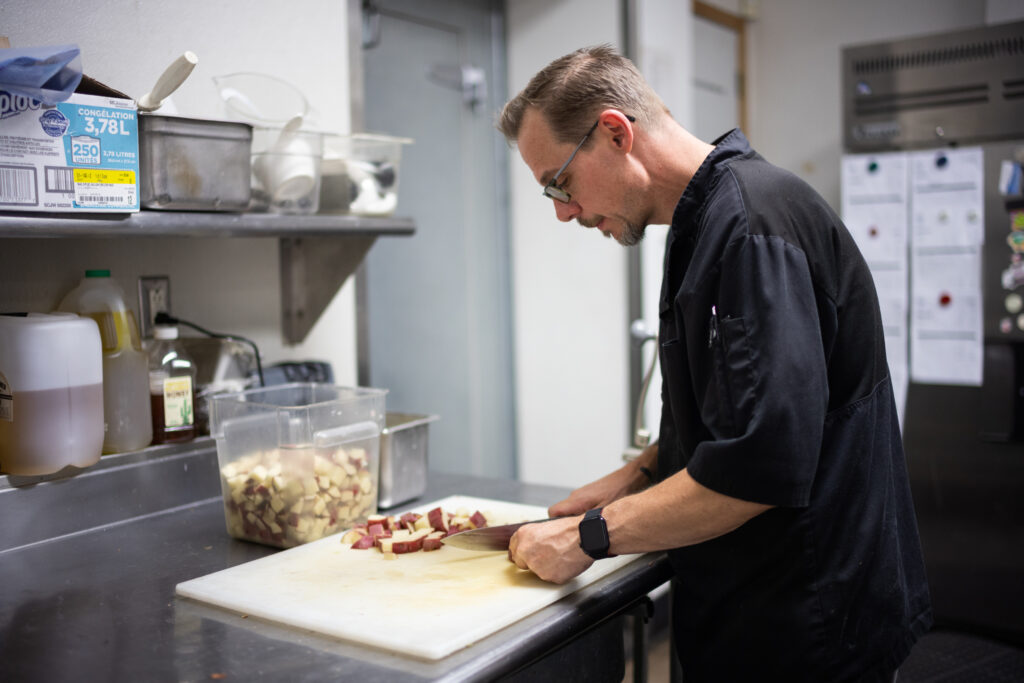
Other meetings with the job coaches occur throughout the day as the shifts change. The average time a trainee works at the café is six months, but sometimes people will get a job sooner than that. Here is when job developers step in and assist with the transition to help them retain the job.
“They don’t necessarily have to move on to restaurant work after working in our kitchen,” said Taylor, adding “But, we sometimes hire trainees as permanent at the café.”
Thanks to a high ceiling, a wall of windows, and exposed brick walls, the space is bright, airy, and inviting.
The exposed brick walls are lined with art created by the former participants or those in the program. They tell emotional stories and all are for sale. The art is another aspect of the Coyote Task Force’s mission and it is the very definition of sustainability.
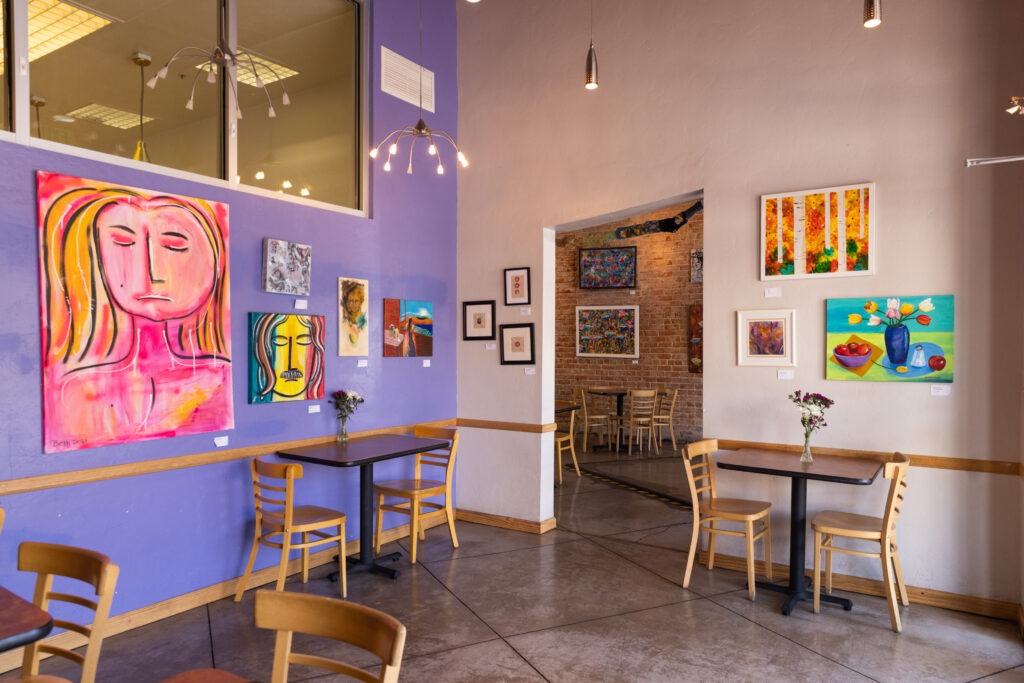
All of the tips earned at the restaurant are used to fund the art program. Using the Coyote Task Force’s account at Sarnoff Artist Materials, the artists can purchase the materials they need for their work.
Finished pieces are displayed at the café. All are for sale. When a work is sold — Grobe says they sell about one a week — all of the money goes to the artist.
At Café 54, and the other parts of the Coyote Task Force, goals stretch far beyond employment.
“It’s also about fighting the stigma, creating a public awareness around the need for more support, and understanding of mental illness,” said Grobe.
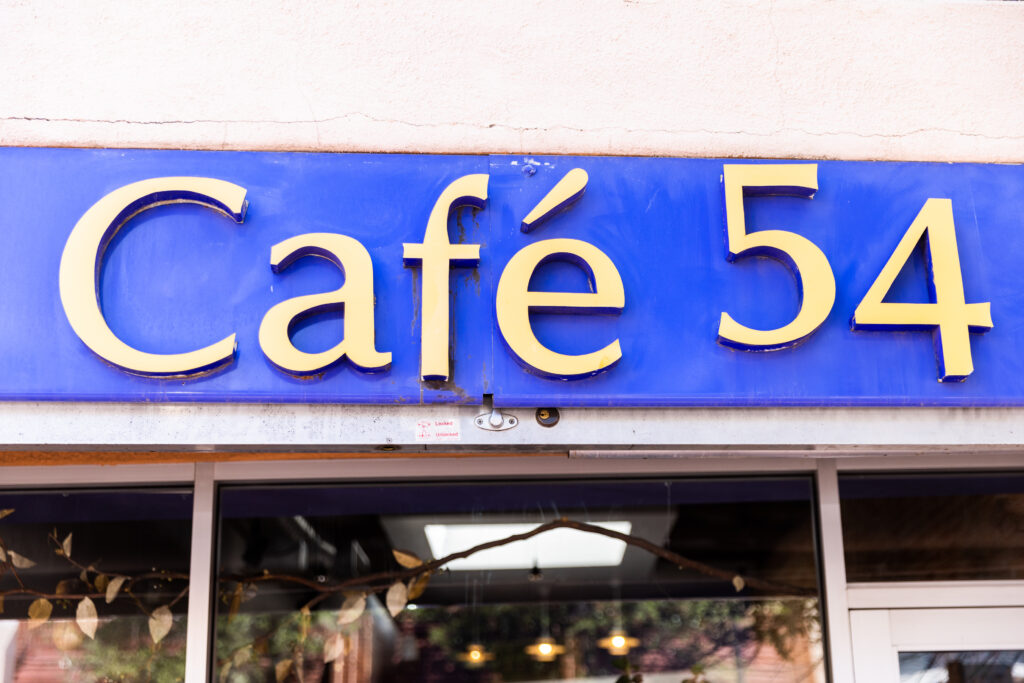
20 years and counting prove that they are succeeding.
Café 54 is located at 54 E. Pennington St. For more information, visit cafe54.org.